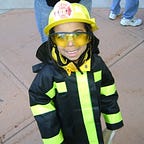Training for the Unimaginable
Many remember vividly where they were, and what they were doing, at the exact time of the World Trade Center attacks on September 11th 2001. Six months into my current position, I walked into the common area at our main station and found firefighters, their eyes glued to the television. My eyes also drifted to the screen and moments later witnessed the second tower being stuck by another plane. Suddenly, it was obvious what we were witnessing. Immediately, my thoughts shifted to the decisions of the on scene commanders. I thought to myself, what would I do, how would I respond? Honestly, my uncertainty and subsequent emotions were quite overwhelming. How do you train and prepare for something so unimaginable?
Very few of us will ever find ourselves in an initial response to scenes of such magnitude and complexity. Our communities may not lend themselves to these scenarios. But, is it not possible to find yourself responding to a mass casualty incident like Columbine; or perhaps a multiple firefighter fatality incident such as Worchester? Could your resources be also requested for disasters like Hurricanes Katrina, Andrew or Ike? To a commander and crew, a response like that can seem just as overwhelming and the loss of even a single firefighter will be devastating. How do you prepare for these potentials?
First, it’s important to take responsibility for things you control. Specifically, do you seek opportunities for improvement and personal growth? I am astonished at the firefighters and officers that rely exclusively on inter-departmental training for self improvement. Prospective firefighters drill, train and study exhaustively to meet the qualification for the job and then when hired relax seeking only to meet the minimum standards required by an organization to keep that job. This is a mistake! Training and job knowledge must be deliberate, continuous and involve a personal commitment. Your life and the lives of your peers rely on this. As an organization, you must create a culture that advances safety and growth. As an individual, you must live up to that culture. In the Phoenix Fire Department Professional Standards Document, this concept is articulated where it states: “Each member of the Phoenix Fire department is responsible and accountable for his/her own actions and for the well being of other members.” There is an expectation of job competence and at no time is this more important than in critical, high-stress events when lives are most at risk.
Emphasis must be placed on forethought when training for complex, low frequency events. Planning is essential and testing plans is even more imperative. Plans must stress the importance of building an organizational structure that supports a growing event (NIMS compliance) and scene safety. The sooner this is done, the better the outcome will be. Think big picture and identify resources available to your organization. Know what local, state and national assets exist? Are you familiar with IMAS, MABAS and Go Teams? Test your ability to identify assets and your test plan assumptions. Assumptions may be inaccurate. Do they align with public expectations? I recall watching news footage of hurricane Katrina with my wife. A particularly disturbing image was broadcast of dead bodies lying on a bridge. Responders walked by, as properly trained to do, looking for viable victims in need of their services as taught in basic triage. I understood this. My wife however, was very disturbed by their decision. She saw it as a lack of compassion. The point here is not to suggest that the responders should have behaved differently. It is simply to remind you of the need to test assumptions allowing you to better communicate actions that may be inconsistent with community expectations; and better predict behavior of firefighters under duress.
Educate yourself beyond the boundaries of your agency. Expand your depth of knowledge and experience. This benefits you in the critical task of risk-benefit analysis. What has experience taught you? Analysis is critical when managing major events. It must be deliberately and consciously done. Conversations must take place between Command, Operations and Planning that considers best and worst case scenarios. Train to that end. Decisions must be governed by assessment and emotion must be removed from the equation to properly protect responders. Ask yourself, will your actions likely enhance or worsen the outcome of this incident? Proceed accordingly.
September 11 changed the fire service forever. With increasing grant funds and the feds adopting the National incident Management System we are more effective and better prepared than ever. Remember these points:
1. Take personal responsibility for training and safety
2. Educate yourself continuously learn about new assets IMTS, MABAS and Go Teams
3. Test plans, skills and assumptions including; auto-aid, mutual aid and communications inter-operability
4. Expand your knowledge and experience to better perform risk-benefit analysis
